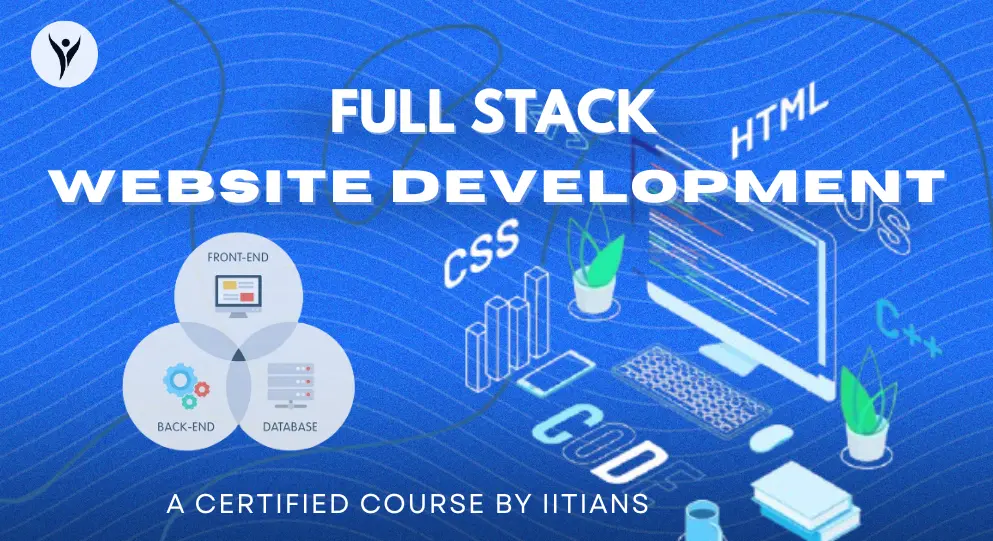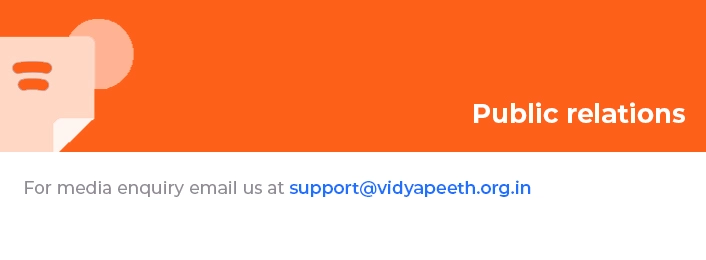
-
LevelAll Levels
-
Last Updated01/08/2025
-
CertificateCertificate of completion
A course by
Advance your career with in-demand skills
- Receive professional-level training from Vidyapeeth
- Demonstrate your technical proficiency
- Earn an employer-recognized certificate from Vidyapeeth


Vidyapeeth: Full-Stack Developer Certification
1. Introduction
- Overview of front-end and back-end development.
- Career opportunities and applications.
- Tools and technologies used by full-stack developers.
2. Front-End Development
- HTML5 & CSS3
- Basics of web structure and styling.
- Responsive design using Flexbox and CSS Grid.
- JavaScript
- Core JavaScript concepts (variables, loops, functions, etc.).
- ES6+ features (arrow functions, destructuring, promises).
- Front-End Frameworks and Libraries
- React.js or Vue.js for building dynamic user interfaces.
- Components, state management, hooks, and routing.
- Version Control with Git
- Introduction to Git and GitHub.
- Best practices for version control and collaboration.
3. Back-End Development
- Node.js and Express.js
- Setting up a Node.js environment.
- Building RESTful APIs with Express.js.
- Databases
- SQL (MySQL/PostgreSQL): Creating and managing relational databases.
- NoSQL (MongoDB): Working with document-based databases.
- Authentication and Authorization
- JWT tokens, OAuth, and session-based authentication.
- Role-based access control (RBAC).
4. Full-Stack Project Development
- Building a full-fledged web application.
- Connecting front-end with back-end via APIs.
- Deployment on platforms like Heroku, AWS, or DigitalOcean.
- CI/CD (Continuous Integration/Deployment) pipeline basics.
5. DevOps and Cloud Basics
- Docker: Containerization and microservices.
- Cloud Platforms: Basic introduction to AWS, Azure, or Google Cloud.
- Managing production environments and scaling applications.
6. Capstone Project
- Students build a complete full-stack application from scratch.
- The project could include features like user authentication, CRUD operations, database integration, and cloud deployment.
Additional Topics (Optional)
- Web security (e.g., XSS, CSRF, SQL Injection).
- Performance optimization.
- Unit testing and end-to-end testing (Jest, Mocha, Cypress).
- hs.


What I will learn?
- Develop with front-end development languages and tools such as HTML, CSS, JavaScript, React and Bootstrap
- Program applications using back-end languages and frameworks like Express, Node.js, Python, Django, etc.
- Deploy and scale applications using Cloud Native methodologies and tools like Containers, Kubernetes, Microservices and Serverless Functions
- Build your GitHub portfolio by applying your Full Stack Cloud Development skills with multiple labs and hands-on projects, including a capstone
Course Curriculum
Introduction to Cloud Computing
Introduction to HTML, CSS, & JavaScript
Getting Started with Git and GitHub
Developing Front-End Apps with React
Developing Back-End Apps with Node.js and Express
Python for Data Science, AI & Development
Developing AI Applications with Python and Flask
Django Application Development with SQL and Databases
Introduction to Containers w/ Docker, Kubernetes & OpenShift
Application Development using Microservices and Serverless
Full Stack Application Development Capstone Project
Full Stack Software Developer Assessment
Software Developer Career Guide and Interview Preparation
-
LevelAll Levels
-
Last Updated01/08/2025
-
CertificateCertificate of completion
A course by
Material Includes
- Video Lectures – Covering key topics in front-end, back-end, and full-stack development.
- Code Samples – Example projects and code snippets.
- Assignments – Practical exercises for each module.
- Quizzes – To reinforce learning after each section.
- Project Guides – Step-by-step guides to building real-world applications.
- Reading Material – Documentation, articles, and reference guides.
- Discussion Forums – For peer interaction and Q&A.
- Live Coding Sessions – Optional live classes or recorded coding sessions.
- Capstone Project – Instructions and requirements for the final full-stack project.

Why people choose Vidyapeeth for their career

Aryan Mishra
Learning at my own pace has been a game-changer. The flexibility to study when it fits my schedule has made all the difference in my education

Pranjal
The skills I picked up at Vidyapeeth were immediately useful. I took what I learned straight into a groundbreaking project at work, and it paid off!

Anuj Jain
Thanks to Vidyapeeth, I was able to apply new knowledge instantly to an exciting work project—boosting both my confidence and career trajectory

Sambhavi
Vidyapeeth gave me the tools I needed to excel. I translated classroom lessons into real-world results at my job, and it’s opened up new opportunities.
Frequently asked questions
Who is this program for ?
This program is for learners who are interested in starting a career in web and back-end development
What background knowledge is necessary ?
This program is suitable for those with and without college degrees. It does not require any prior programming or cloud skills. It does require a basic understanding of computing environments and computer literacy such as familiarity working with files and folders in an operating system, launching, using and switching between applications, running commands, copying and pasting text and files, taking screenshots, etc. Above all, it requires the desire and motivation to learn online in a self-paced manner.
What do back end developers do ?
Back-end developers are the experts who build and maintain the mechanisms that process data and perform actions on websites, and the demand for them has never been greater.
How long it take to complete the professional certificate ?
This Professional Certificate is self-paced and can be completed on your own schedule. It consists of several courses requiring 10-12 hours of effort on average. If you complete about 1 course per month, it would take you around 4 months to complete the entire program. Learners completing 1 course per week, could finish sooner in 2-3 months.


